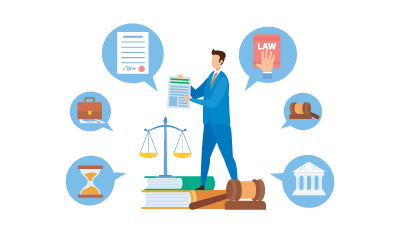Discovering Legal Training
Navigating the path to expertise through specialized legal education and skill development
In today's complex legal environment, success depends not only on understanding legal theory but also on developing practical skills that can be applied in real-world situations. Discovering the right legal training path can be the crucial difference between an ordinary legal career and one marked by excellence and distinction.
What Makes Legal Training Essential?
Legal training bridges the critical gap between theoretical knowledge and practical application. While traditional legal education provides foundational understanding, specialized training programs like those offered by Al Mithaq Institute equip professionals with the specific skills needed to excel in today's demanding legal marketplace.
1 Types of Legal Training
Legal training comes in many forms, each serving different career stages and specialization needs:
- Professional Diplomas - Comprehensive programs covering specialized legal areas
- Skills Certificates - Focused training on specific legal skills like contract drafting or advocacy
- Continuing Legal Education - Ongoing professional development for practicing lawyers
- Specialized Workshops - Intensive training on emerging legal topics and technologies
2 Core Benefits
Proper legal training delivers multiple advantages that extend beyond basic knowledge:
- Career Advancement - Opening doors to specialized positions and promotions
- Practical Competence - Developing skills that can be immediately applied in practice
- Professional Network - Building connections with instructors and fellow professionals
- Confidence - Gaining assurance in handling complex legal matters

Specialized legal training combines theoretical knowledge with practical application through interactive learning methods
Key Legal Training Areas
Legal Practice Skills
Training focused on the day-to-day skills required in legal practice, including:
Legal Research & Analysis
Mastering efficient research techniques and analytical frameworks for legal problem-solving
Legal Writing & Drafting
Developing skills to create precise, persuasive legal documents and correspondence
Client Consultation
Learning effective interviewing and counseling techniques for diverse client needs
Advocacy & Negotiation
Building persuasive oral advocacy skills and strategic negotiation approaches
Al Mithaq Institute offers comprehensive training in these areas through programs like Advocacy and Defense Memorandum Drafting and Contract Drafting and Legal Memorandums.
Specialized Legal Domains
Training that focuses on specific areas of legal practice:
| Legal Domain | Skills Focus | Career Opportunities |
|---|---|---|
| Corporate Law | Corporate governance, compliance, commercial transactions | In-house counsel, corporate law firms, compliance officers |
| Criminal Law | Criminal procedure, evidence, defense strategies | Prosecutors, defense attorneys, legal consultants |
| International Law | Treaty interpretation, cross-border regulations, diplomatic protocols | International organizations, diplomatic corps, global law firms |
| Personal Status Law | Family disputes, inheritance, custody matters | Family court advocates, mediators, legal advisors |
Al Mithaq Institute offers specialized diplomas in these domains, including Corporate Law and Legal Affairs, Criminal Law, International Law, and Personal Status Law.
Legal Technology
Training in the increasingly important intersection of law and technology:
Legal Document Automation
Using technology to streamline document creation and management
E-Discovery
Managing electronic evidence collection and analysis
Cybersecurity Law
Understanding legal frameworks for digital security and privacy
Al Mithaq Institute's Cybersecurity Leadership and Information Technology diplomas provide cutting-edge training in these emerging areas.
"The most successful legal professionals combine deep theoretical knowledge with practical skills and technological fluency. Modern legal training must address all these dimensions to prepare practitioners for today's complex legal environment."
Choosing the Right Legal Training
Selecting the most appropriate legal training program depends on several factors that align with your career goals and personal circumstances:
Assessment Criteria for Legal Training Programs
Accreditation & Recognition
Ensure the program is accredited by relevant authorities and recognized within the legal profession. Al Mithaq Institute is licensed by the Knowledge and Human Development Authority (KHDA) in Dubai.
Instructor Qualifications
Look for programs with instructors who have both academic credentials and substantial practical experience in their field. Al Mithaq Institute's faculty has over a decade of academic and industry experience.
Learning Methodology
Consider programs that balance theoretical knowledge with practical exercises, case studies, and hands-on application opportunities.
Flexibility & Accessibility
Evaluate whether the program's schedule and format (in-person, online, or hybrid) align with your work and personal commitments. Al Mithaq Institute offers both online and in-person training options.
FAQ: Discovering Legal Training
How does specialized legal training differ from a law degree?
While law degrees provide broad theoretical foundations, specialized legal training focuses on practical skills and specific practice areas. They are complementary: a law degree gives you the knowledge base, while specialized training prepares you for actual practice in specific contexts.
Do I need legal training if I already have years of practice experience?
Experienced practitioners benefit from specialized training when transitioning to new practice areas, adapting to regulatory changes, or incorporating new technologies into their practice. Continuing education ensures your skills remain current in a rapidly evolving profession.
How can I measure the ROI of legal training?
Return on investment can be measured through career advancement opportunities, increased efficiency in your practice, expanded client base, and the ability to offer more specialized services. Many professionals report that specialized training opens doors to new career paths that were previously inaccessible.
What role does technology training play in modern legal practice?
Technology training is increasingly essential as legal practice becomes more digitized. Understanding legal tech tools can dramatically improve efficiency, reduce errors, enhance client service, and create competitive advantages in the marketplace.
Legal Training Career Pathways
Specialized legal training can open doors to various career paths and opportunities:
Traditional Legal Practice
Enhanced skills for law firm practice, litigation, and client representation:
- • Advanced advocacy techniques
- • Specialized practice area expertise
- • Client management skills
- • Case strategy development
Relevant Al Mithaq programs: Advocacy and Defense Memorandum Drafting, Court and Arbitration Advocacy
Corporate Legal Departments
Skills for in-house counsel roles across industries:
- • Contract management
- • Regulatory compliance
- • Risk assessment
- • Business strategy alignment
Relevant Al Mithaq programs: Corporate Law and Legal Affairs, Commercial Law, Contract Drafting
Government & Public Service
Competencies for roles in government agencies and public entities:
- • Administrative law expertise
- • Public policy understanding
- • Regulatory drafting
- • Intergovernmental relations
Relevant Al Mithaq programs: Administrative Law, Public and Private Law, Official Media Spokesperson Skills
International Organizations
Capabilities for roles in global legal environments:
- • International law frameworks
- • Cross-cultural legal practice
- • Diplomatic protocols
- • Treaty interpretation
Relevant Al Mithaq programs: International Law, Diplomatic Relations and International Negotiation
Success Stories: The Impact of Legal Training
"The specialized training in International Law at Al Mithaq Institute transformed my career trajectory. The practical skills and professional connections I gained enabled me to transition from local practice to an advisory role at a multinational organization."
– Sarah K., Legal Advisor
"After 15 years in corporate practice, I needed to refresh my skills and understand emerging legal technologies. The Cybersecurity Leadership program provided exactly the knowledge I needed to modernize our firm's approach to digital legal issues."
– Ahmed M., Managing Partner
Conclusion: Your Legal Training Journey
Discovering legal training is about finding the right path to enhance your professional capabilities and achieve your career ambitions. Whether you're a new graduate, an experienced practitioner looking to specialize, or a professional seeking to transition into the legal field, specialized training provides the structure, guidance, and skill development necessary for success.
By approaching legal training as a strategic investment in your professional development, you can systematically build the expertise needed to navigate today's complex legal landscape with confidence and competence.
Explore Al Mithaq Institute's Legal Training Programs
Al Mithaq Institute offers a comprehensive range of KHDA-accredited legal training programs designed to enhance your professional skills and career prospects:
- Criminal Law
- Commercial Law
- International Law
- Contract Drafting and Legal Memorandums
- Corporate Law and Legal Affairs
- Advocacy and Defense Memorandum Drafting
- Cybersecurity Leadership
Visit Al Mithaq Institute's course catalog to begin your journey toward legal excellence.







